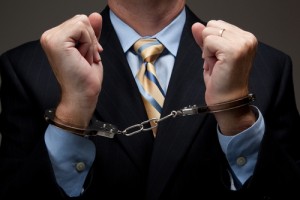Ethical transgressions manifest in a number of ways, including outright criminal behavior tied to an offender’s professional conduct within an organization. As one might expect; power and financial gain are common motivating forces prompting employees to go rogue. To many onlookers, however, white collar crime  cannot be easily rationalized. After all, many white collar criminals are already rich, so Middle America has a hard time relating to their drive to use fraudulent schemes to rein-in even bigger profits.
cannot be easily rationalized. After all, many white collar criminals are already rich, so Middle America has a hard time relating to their drive to use fraudulent schemes to rein-in even bigger profits.
Each case is unique, but recent ethical meltdowns across financial industries have brought high-profile cases to the public eye, prompting a general sense of mistrust among casual observers. The fact is; individuals account for ethical missteps, so sweeping generalizations don’t always hold true. There are common features present in many stories of white collar crime, however, including the following observations about white collar crime.
Organizational Culture Contributes to Ethical Lapses
It is up to each individual company or organization to set the prevailing tone among employees and with external business partners. Competitiveness, for example, is a widely held corporate value, instilled in staffers at all levels. While gaining a competitive edge is essential for economic survival, it cannot be done at all costs. Ethical and professional controls, for example, must instead be put in place to guide overzealous staffers to moral high-ground. Organizations that fail to adequately promote accountability and ethical practices are more vulnerable to transgressions by individuals, who justify their failures by referring to perceptions and the company’s moral practices.
View from the Top is Skewed
Ethical breakdowns occur for a variety of reasons, which cannot always be accounted for as sheer greed and power-grabs. In reality, the behavior of white collar criminals sometimes stems from their individual inability to recognize immoral behavior. While it may seem like a cop-out, the plain truth is that upper-level executives and other powerful players see the world through an entirely different lens than rank-and-file employees. As a result, bad behavior often reflects a different standard held by top members of the organizational hierarchy.
Personal and Professional Conduct are Linked
Moral transgressions take many forms, including personal failures within families and other missteps occurring outside the workplace. While personal failures don’t always lead to professional misconduct, there is an undeniable link between the way people conduct themselves on the job and the personal standards they maintain outside work.
White Collar Criminals Share Character Traits
Creating effective organizational controls involves an across-the-board approach, rather than a piecemeal strategy targeting particular employees. However, there are behavioral cues tied to white collar criminals, which provide valid insight into the motivation of individuals willing to risk their careers with unethical behavior. Low levels of accountability, for example, typically characterize criminals whose arrogance doesn’t allow them to properly own-up to their actions.
Ironically, positive character traits like creativity and cunning are also on display in many cases of white collar crime. Not only do these skills help white collar criminals craft complex, fraudulent schemes, but they also reinforce their ability to rationalize their transgressions, after the fact.
Deception is at the Heart of White Collar Crime
Strong-arm tactics are used by common criminals every day; exposing their misdeeds the moment they are committed. White collar criminals, on the other hand rely on deception to run their schemes, sometimes evading detection for extended periods of time. Rigid controls, which instill accountability at all levels, furnish the best defense against white collar criminals, who often try to distance themselves from the immoral practices they undertake.
In one way or another, most criminal enterprises leave ethics on the sidelines. Among white collar criminals; arrogance, lack of accountability, and an impaired moral compass are frequently at play, prompting behavior that falls outside accepted standards. In some cases, desirable character traits like ingenuity and creativity help white collar criminals hide their misdeeds, which rely on deception and distraction to carry-on.
Author:
Daphne Holmes contributed this guest post. She is a writer from arrestrecords.com and you can reach her at daphneholmes9@gmail.com.


Great Article…
It’s interesting how competitiveness, for example, is a widely held corporate value, instilled in staffers at all levels. One of my friends told me that she has been working hard to get promoted but there is an executive that has been trying to stop her from getting promoted. It might be a good idea for her to get professional advice so she can reach her professional goal.
It’s actually a great and useful piece of info. I’m happy that you just shared this useful info with us. Please stay informed like this. Thank you for sharing. Here’s another informative content. Corporate Crime In Canada You may find more details here.